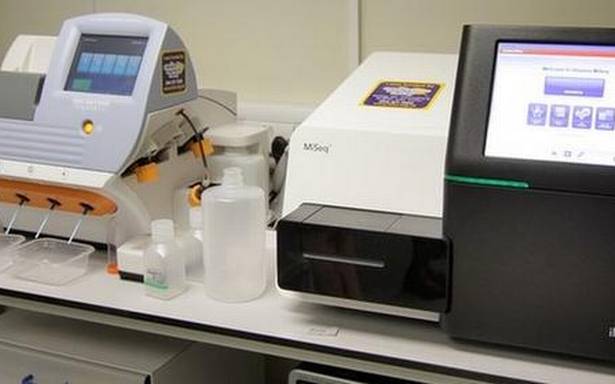Besides, it collaborates with CSIR institute to employ new protocol for diagnosing the virus with high confidence
Kurnool Medical College’s VRDL is the first laboratory in South India to collaborate in employing a new protocol – ‘COVIDSeq Next-Generation Sequencing’ – for diagnosis and phylogenetic analysis of SARS nCoV-2 (COVID-19) samples.
This is the next-generation confirmatory test for COVID-19 done at CSIR Institute of Genomics and Integrative Biology, and will be useful for other viruses in the future.
The sequencing approach has also provided insights into the evolution and genetic epidemiology of the SARS-CoV-2 samples, in addition to detecting a new variant N440K that was responsible for causing re-infections.
Findings
In a research article published in the German Scientific Journal, ‘Plos One’, on February 17, the authors said that seven institutions in India that were permitted by the CSIR Institute of Genomics and Integrative Biology to use the protocol (approved for clinical trials by the US Food & Drug Administration) could discover two lineages of SARS nCOV-2 (B.1.112 and B.1.99), 73 novel variants, and 1143 unique single nucleotide variants.
Pallavalli Rojarani, one of the authors and a specialist in microbiology, who was appointed by the State government for a temporary period of one year during the COVID-19 pandemic in the Kurnool Medical College, told The Hindu that the KMC-VRDL was the only institution participating in it from South India.
“We used the approach on 752 clinical samples in duplicates (1,536 in all), which could be sequenced on a single S4 sequencing flow cell on NovaSeq 6000 machine. Our analysis suggests a high concordance between the technical duplicates and a high concordance of detection of SARS-CoV-2 between the COVIDSeq and RT-PCR approaches,” said Ms. Rojarani.
COVIDSeq could detect SARS-CoV-2 in six samples with high confidence, which were shown negative in the RT-PCR that was being considered the gold standard so far.
Ms. Rojarani explained that the assay could also detect SARS-CoV-2 in a set of 21 samples and in another 16 samples that were classified inconclusive and Pan Sarbeco positive, suggesting that COVIDSeq could be used as a confirmatory test.
She thanked KMC Principal and Additional DME P. Chandrasekhar for the support to get this facility by convincing the government.
The microbiologist said she had also worked on 272 samples from June 20, 2020, until September 2020, when the spread was quick and a large number of fatalities were recorded in A.P.
The N440K strain with origin in Kurnool was seen to have spread all over A.P. and some of the neighbouring States. This was another achievement of the laboratory.
Wide utility
“By employing this NGS, we can know the behaviour of various bacteria, fungal, viral, genetic disorders of the foetus,” she said while explaining about the advantages of having the machine.
Source: Read Full Article

